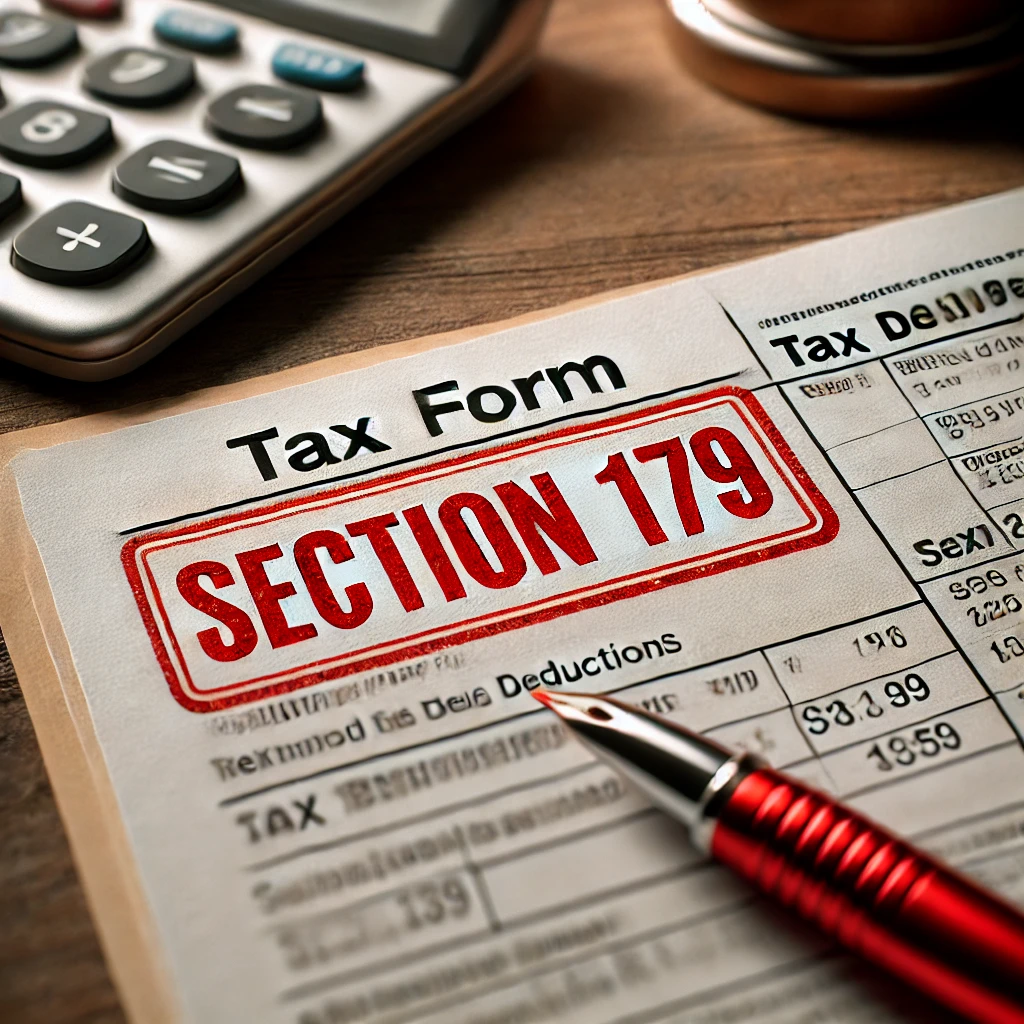Introduction
If you’re a business owner who loves upgrading your equipment and saving money on taxes, you’re going to want to pay close attention.
Because today, we’re talking about Section 179—a powerful tax deduction that lets you write off the full purchase price of qualifying equipment the same year you buy it.
No waiting years for depreciation. No complicated tax loopholes. Just an upfront deduction that can put real money back in your pocket.
But like every tax deduction, Section 179 comes with rules, limitations, and potential pitfalls. If you don’t use it correctly, you could face fines, penalties, or even trigger an IRS audit.
So in this blog, we’re breaking down:
- • What Section 179 is and how it works
- • Who qualifies and what the limits are
- • How to claim the deduction properly
Let’s dive in.
What Is Section 179?
Section 179 is a tax deduction that allows business owners to deduct the cost of qualifying equipment and software as an expense in the year it’s placed into service.
Instead of depreciating the item over multiple years, you can deduct the full cost upfront, giving you an immediate tax benefit.
Unlike special depreciation, Section 179 gives you more flexibility.
You don’t have to deduct the entire cost if you don’t want to. You can choose to deduct part of it now and spread the rest over future years.
A few key benefits of Section 179:
- • You don’t need to buy brand-new equipment—used equipment qualifies too.
- • You don’t even have to own the item outright—leasing and financed equipment also qualify.
- • As long as the purchase is new to you and used for business, you can claim the deduction.
Who Qualifies for Section 179?
Small business owners and self-employed individuals can use Section 179, but there are some limitations to be aware of.
For 2025, here are the key limits:
- • Maximum deduction: $1,250,000
- • Spending cap: $3,130,000 (after this, the deduction begins to phase out)
- • Absolute limit: If you spend more than $4,380,000, you can’t claim Section 179 at all
Also, you can’t use Section 179 for:
- • Gifts or inherited property
- • Real estate (like buildings or land)
- • Expenses that exceed your business’s income (though you can carry forward your losses)
What Purchases Qualify for Section 179?
You can use Section 179 to deduct the following business purchases:
- ✅ Manufacturing equipment
- ✅ Office furniture and equipment
- ✅ Computers and laptops
- ✅ Business vehicles (with certain weight restrictions)
- ✅ Commercial software
- ✅ Certain improvements to non-residential property (roofs, HVAC, security systems, etc.)
How to Claim the Section 179 Deduction
To claim Section 179, you need to:
- Purchase and place qualifying equipment into service during the tax year
- Keep detailed records and receipts for all purchases
- File IRS Form 4562 when you do your taxes
That’s it! As long as you meet the requirements and file correctly, you can write off thousands in business expenses.
Key Benefits of Section 179
Here’s why every business owner should consider using this deduction:
- ✅ Write off thousands in business purchases
- ✅ Deduct new or used equipment
- ✅ Get immediate tax savings instead of waiting years for depreciation
- ✅ Choose how much of the cost to deduct now vs. later
- ✅ Carry forward any unused deduction into future years
- ✅ Works in many states that disallow special depreciation
Final Thoughts: Don’t Leave Money on the Table
If you’re making business purchases, not using Section 179 means leaving money on the table.
But tax laws can get tricky, and making a mistake could cost you thousands in penalties.
That’s why we recommend working with a tax professional to make sure you maximize your deduction while staying compliant.
Need expert guidance? Click here to connect with a certified tax professional who can help you claim every tax benefit you deserve.
Frequently Asked Questions (FAQ)
1. What is Section 179?
Section 179 is a tax deduction that allows business owners to write off the full cost of qualifying equipment and software in the year they purchase it, rather than depreciating it over multiple years.
2. Who qualifies for the Section 179 deduction?
Small business owners and self-employed individuals can claim Section 179, as long as they use the purchased equipment for business purposes and meet the deduction limits.
3. What is the maximum deduction for Section 179 in 2025?
For 2025, the maximum deduction is $1,250,000, with a spending cap of $3,130,000. If total qualifying purchases exceed $4,380,000, the deduction is no longer available.
4. What types of purchases qualify for Section 179?
Qualifying purchases include:
- Manufacturing equipment
- Office furniture and equipment
- Computers and business software
- Business vehicles (with weight restrictions)
- Certain improvements to non-residential property (roofs, HVAC, security systems, etc.)
5. Can I use Section 179 for used equipment?
Yes! The equipment doesn’t have to be brand new—it just needs to be new to you and used for business.
6. Does leased or financed equipment qualify?
Yes, leased and financed equipment qualifies for Section 179, making it a great option for businesses looking to upgrade without paying upfront in full.
7. Can I claim Section 179 on real estate or land?
No, Section 179 does not apply to real estate, land, or inherited property. It only covers tangible business equipment and improvements to non-residential buildings.
8. What happens if my Section 179 deduction exceeds my business income?
If your deduction is greater than your taxable business income, you can carry forward the unused portion to future tax years.
9. How do I claim the Section 179 deduction?
To claim the deduction:
- Purchase and place the equipment into service within the tax year.
- Keep detailed records and receipts.
- File IRS Form 4562 when you submit your tax return.
10. Is Section 179 available in all states?
Most states follow federal Section 179 rules, but some states may have different limits or restrictions. Check with a tax professional to ensure compliance with state tax laws.
11. Can using Section 179 trigger an IRS audit?
While Section 179 is a legitimate deduction, incorrect filings, excessive claims, or missing documentation can increase audit risk. Keep proper records and consult a tax professional for guidance.
12. Should I consult a tax professional before claiming Section 179?
Yes! Mistakes can be costly, and a tax professional can help you maximize your deduction while ensuring compliance with tax laws.
P.S. If you want to read more content, click here to read another article.


